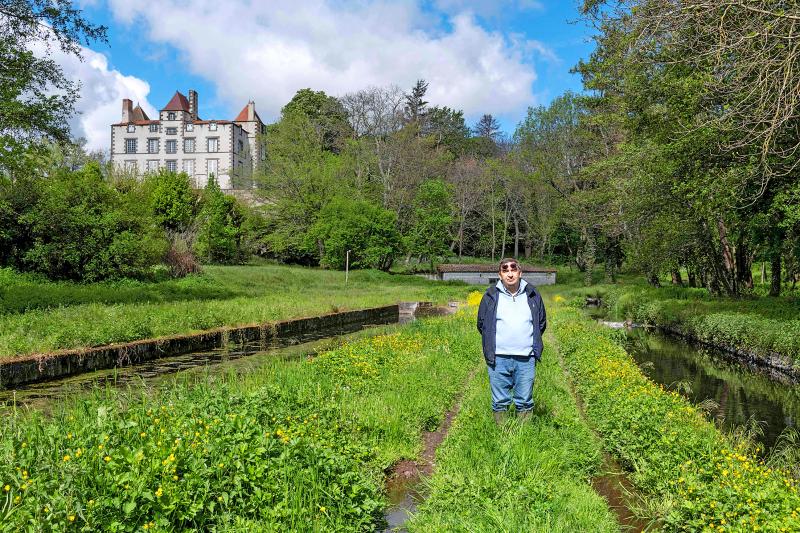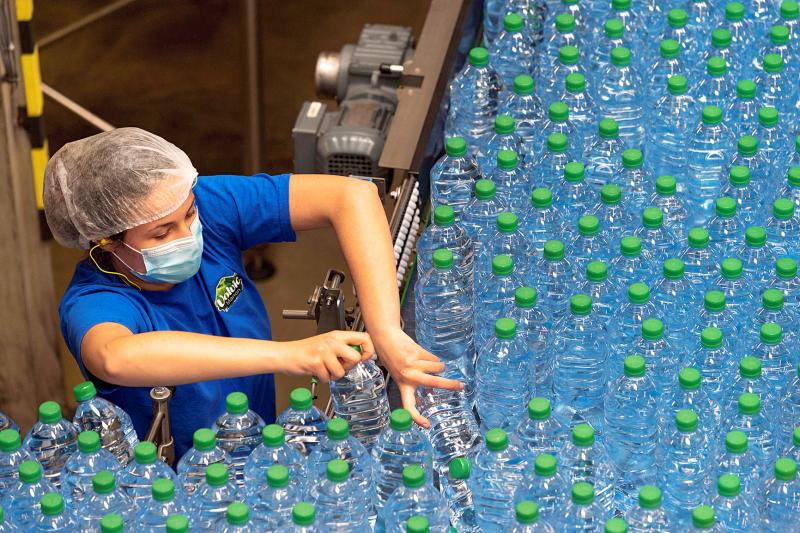The lush volcanic hills surrounding Volvic in central France have long been a source of mineral water prized worldwide, but locals and geologists warn that too much is now being pumped out, putting the entire region at risk.
“We used to have water up to our knees and the stream could turn two mills,” said Pierre Grodecoeur, 69, pointing out the flow outside the house where he was born in Les Moulins Blancs.
The mills are long gone, Grodecoeur said, and these days the stream bed is often dry.

Photo: AFP
His village in the Auvergne region is just down the road from the hulking Volvic bottling plant owned by French food and beverage giant Danone SA.
Since 2014, the government has allowed Danone to bottle up to 2.8 million cubic meters a year — or 2.8 billion one-liter bottles.
That translates into an extraction of nearly 89 liters per second from the Volvic water table, compared with just 15.6 liters when bottling operations first began in 1965.

Photo: AFP
Yet at the nearby fish hatchery of Saint-Genest-l’Enfant, a registered landmark dating from the 17th century where the Volvic source naturally emerges, there are now some months when no water flows at all. The owner, Edouard de Feligonde, had to shut down the fishery a few years ago after duckweed formed slick green films over basins that became stagnant due to a lack of current.
“Danone is destroying a historical monument so that it can send its bits of plastic to the other side of the world,” said Feligonde, who is waging a legal battle against the multinational with lawyer and former French minister of the environment Corinne Lepage.
Geologist Robert Durand said the average flow rate at the Volvic source had fallen to 50 liters per second, far below the 470 liters per second recorded in 1927.
Water shortages are already affecting the region’s biodiversity by reducing the natural humidity of the forested hills.
“It can be described as the beginning of a desertification,” said Christian Amblard, an expert with the French National Centre for Scientific Research in Clermont-Ferrand, the historic capital of Auvergne.
He cited declines in black alder trees and the siskin songbirds that nest in them, and in ash trees and golden orioles.
“Only the hand of man and Volvic are responsible,” he said.
Laurent Campos-Hugueney, a farmer and member of the Water is a Public Good collective, said streams around Volvic no longer flow strongly enough to support irrigation.
“There hasn’t been any plant or vegetable operations in the area for several years,” he said.
However, Jerome Gros, director at the Volvic bottling site, disputed the claim that his operations are sucking the waterbed dry, and said that Danone is investing heavily in protecting the source.
“We have saved 380 million liters between 2017 and 2020 even as sales remained stable,” Gros said.
In 2014, for example, Volvic needed to pump out two liters to fill a one-liter bottle, with the excess used for sterilizing and rinsing equipment. “Today we’re down to just 1.4 liters for every liter bottled,” he said.
Critics are not convinced, saying that Volvic pumps up water from up to 100m deep, and that stream depletions cannot be ascribed to the weather as rainfall has remained steady over the years.
“It’s like you’re emptying a bathtub from the bottom,” said Francois-Dominique de Larouziere, a geologist who is member of the local Preva environmental preservation group.
Authorities have also allowed Volvic to spread its volume allotment over the entire year, meaning it can pump more in summer when demand spikes, leaving everyone else high and dry.
The government’s top official for the region, Philippe Chopin, last month told a parliamentary commission that “environmental conditions, in particular drought, caused a drop in the aquifer that we do not believe can be blamed” on Volvic’s extractions.
His assertions were rejected by many at Volvic, where the issuance of building permits was halted in August last year due to a risk of drinking water shortages — although the mayor denied any proof that Volvic’s operations were the cause.
“How can you tell people they can’t water three tomato plants in the middle of summer, when they see full trucks leaving this factory?” De Larouziere said. “Danone is shooting itself in the foot, but when the faucet stops running, it’s going to be painful.”

Nvidia Corp chief executive officer Jensen Huang (黃仁勳) on Monday introduced the company’s latest supercomputer platform, featuring six new chips made by Taiwan Semiconductor Manufacturing Co (TSMC, 台積電), saying that it is now “in full production.” “If Vera Rubin is going to be in time for this year, it must be in production by now, and so, today I can tell you that Vera Rubin is in full production,” Huang said during his keynote speech at CES in Las Vegas. The rollout of six concurrent chips for Vera Rubin — the company’s next-generation artificial intelligence (AI) computing platform — marks a strategic

REVENUE PERFORMANCE: Cloud and network products, and electronic components saw strong increases, while smart consumer electronics and computing products fell Hon Hai Precision Industry Co (鴻海精密) yesterday posted 26.51 percent quarterly growth in revenue for last quarter to NT$2.6 trillion (US$82.44 billion), the strongest on record for the period and above expectations, but the company forecast a slight revenue dip this quarter due to seasonal factors. On an annual basis, revenue last quarter grew 22.07 percent, the company said. Analysts on average estimated about NT$2.4 trillion increase. Hon Hai, which assembles servers for Nvidia Corp and iPhones for Apple Inc, is expanding its capacity in the US, adding artificial intelligence (AI) server production in Wisconsin and Texas, where it operates established campuses. This

US President Donald Trump on Friday blocked US photonics firm HieFo Corp’s US$3 million acquisition of assets in New Jersey-based aerospace and defense specialist Emcore Corp, citing national security and China-related concerns. In an order released by the White House, Trump said HieFo was “controlled by a citizen of the People’s Republic of China” and that its 2024 acquisition of Emcore’s businesses led the US president to believe that it might “take action that threatens to impair the national security of the United States.” The order did not name the person or detail Trump’s concerns. “The Transaction is hereby prohibited,”

Garment maker Makalot Industrial Co (聚陽) yesterday reported lower-than-expected fourth-quarter revenue of NT$7.93 billion (US$251.44 million), down 9.48 percent from NT$8.76 billion a year earlier. On a quarterly basis, revenue fell 10.83 percent from NT$8.89 billion, company data showed. The figure was also lower than market expectations of NT$8.05 billion, according to data compiled by Yuanta Securities Investment and Consulting Co (元大投顧), which had projected NT$8.22 billion. Makalot’s revenue this quarter would likely increase by a mid-teens percentage as the industry is entering its high season, Yuanta said. Overall, Makalot’s revenue last year totaled NT$34.43 billion, down 3.08 percent from its record NT$35.52